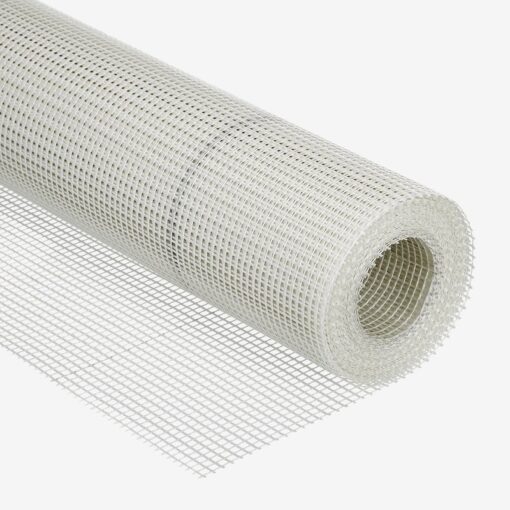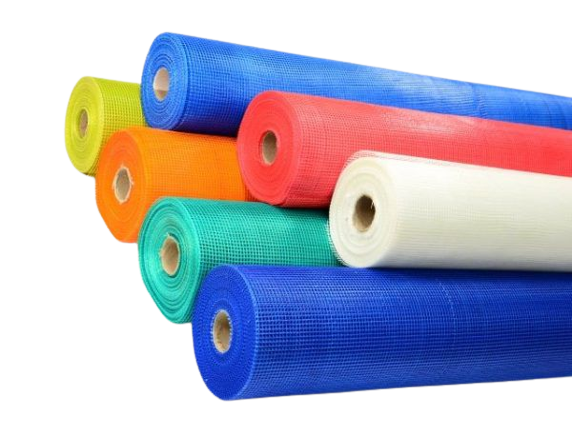GLASS MESH
The key purpose of the glass mesh is the reinforcement of the structure and its individual layers. It is used for thermal insulation, strengthening walls, protecting roofs from moisture, and strengthening plaster. This product is an excellent option for all types of work. The glass mesh allows you to increase the service life of the plaster, prevents it from crumbling, deforming, cracking. At the same time, the material itself is not subject to corrosion, does not stretch or lose its shape during prolonged operation, and has high strength.
And importantly, it has an affordable price.
Features of glass mesh
The advantages of this material include alkali resistance, as well as water resistance. The glass mesh perfectly tolerates all kinds of influences and has a long service life. The canvas is light in weight and has high strength. Thanks to this, it can be used even for new buildings.

Reinforcing glass mesh has good impact resistance. It is resistant to mold. The cloth is non-flammable, improves heat and sound insulation properties. In addition, it strengthens the frame, makes it durable and reliable.
Types of glass mesh
Depending on the purposes for which it is used, the following options are distinguished:
- facade. It is used for finishing facades and roofs.
- plastering. It is used to strengthen the plaster layer.
- masonry. It has a relatively large weight and strengthens the structure of blocks, bricks and other materials.
- painting. It is used indoors for a thin coating layer.
But not only the type of work differs in the material, but also the characteristics.
These include:
- weight;
- thread thickness;
- cell size;
- color;
- price.
At the same time, it is worth noting that some characteristics are interrelated. For example, a heavier product with strong threads and large cells is suitable for road work. The material for facades and plasters may have small cells.
The cell sizes can be 3 by 3, 10 by 10, 4 by 4 mm. The weight may also vary depending on the thickness of the thread. It can reach 160 g / m2. The canvas is supplied in rolls from 50 to 500 m., which simplifies its transportation and installation.
How to choose a glass mesh?
Fiberglass plaster is suitable for all types of surfaces. It has excellent adhesion, so it has found application for walls and other structures. When choosing a product, it is necessary to take into account the thickness of the mortar layer, plaster. If it is small, it is better to select a canvas with small cells. If it is masonry walls, facade work, then it is worth buying a glass mesh with large cells. The medium size category includes a canvas with cells 5 by 5, and small ones 2 by 2.

Product Specification
Main cell sizes: 3x3 mm, 4x4mm, 5x5mm, 10x10 mm.
Weight of 1 sq.m.: 45 g/ m2, 60 g / m2, 75 g / m2, 110 g / m2, 120 g / m2, 145 g / m2, 160 g / m2.
Roll length: 50 m, 100 m, 300 m, 500 m.
Roll width: from 10 cm to 200 cm.
Color: white (standard), blue, yellow, green, red, etc.
More detailed specifications are listed below:
|
Weight |
Cell size (mm) |
Regular siren |
Standard length |
Roll diameter |
Available answers |
| 50 | 5x5 | 100 | 100 | 19.5td> | White, yellow, blue, green, etc. |
| 75 | 4x4 / 4x5 | 100 | 100 | 19,5 | |
| 100 | 5x5 | 100 | 100 | 20,5 | |
| 110 | 5x5 | 100 | 100 | 21,5 | |
| 110 | 10x10 | 100 | 50 | 18,5 | |
| 125 | 5x5 | 100 | 100 | 24 | |
| 130 | 5x5 | 100 | 50 | 17 | |
| 145 | 4x4 | 100 | 50 | 18,5 | |
| 145 | 5x5 | 100 | 50 | 17,5 | |
| 155 | 4x5 | 100 | 50 | 17,5 | |
| 160 | 4x4 | 100 | 50 | 17,5 | |
| 160 | 5x5 | 100 | 50 | 17,5 | |
| 300 | 5x6 | 100 | 50 | 23,5 |




